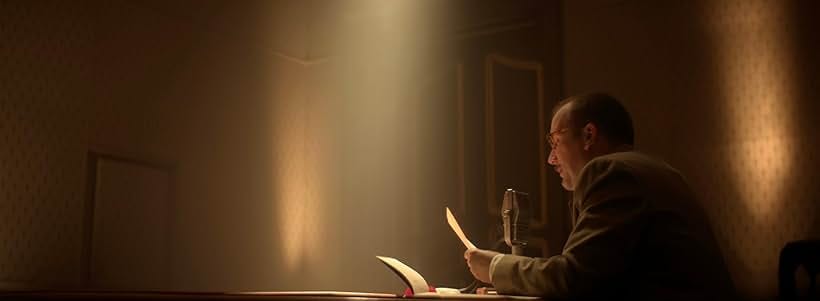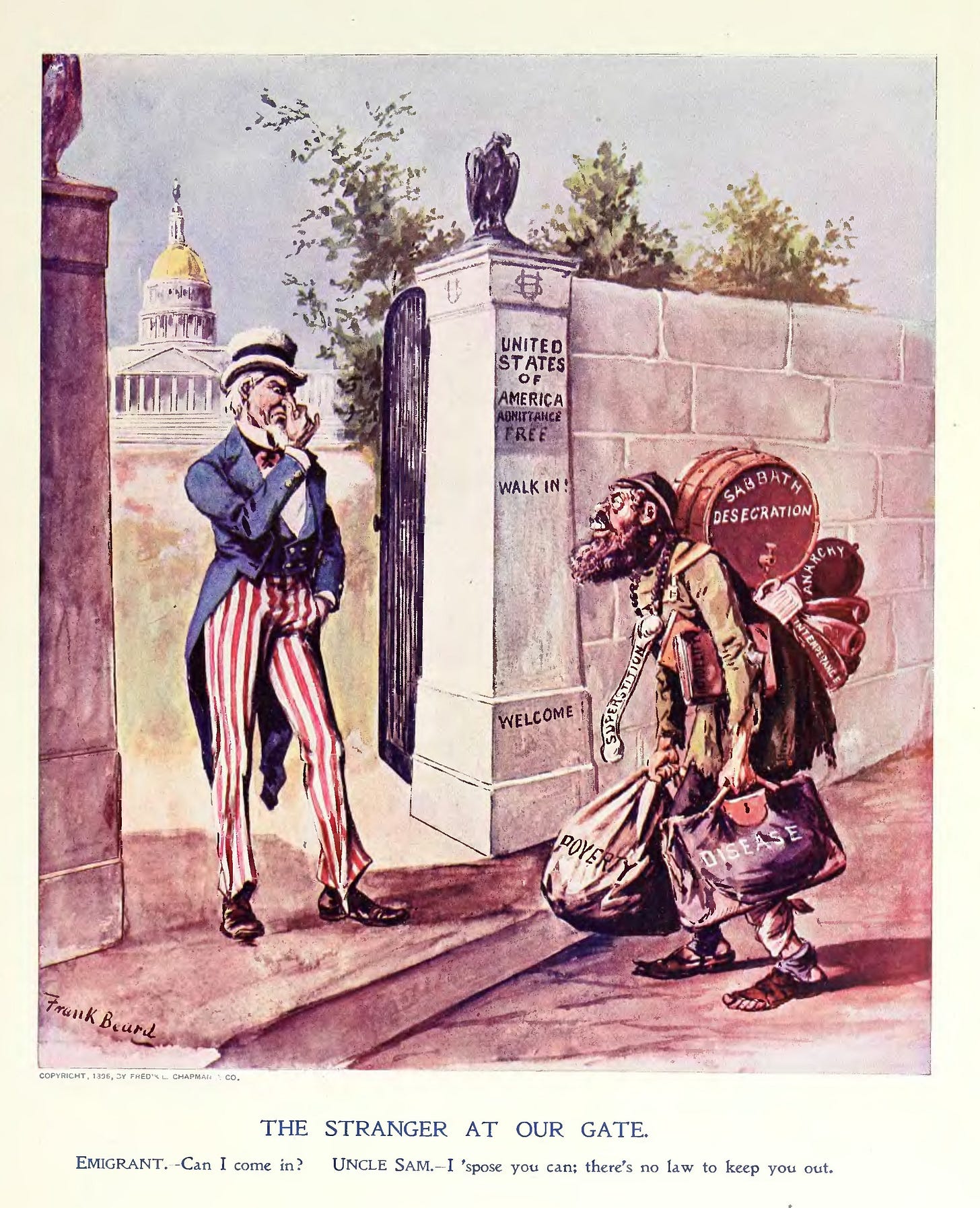Review of "Hitler and the Nazis: Evil on Trial"
The new Netflix docuseries is important for everyone—especially if you don't think American anti-immigrant rhetoric is anything to worry about.
“I thought Churchill was the chief villain of the Second World War.” This was declared by podcaster Darryl Cooper in September when speaking with Tucker Carlson—the professional outrage pundit who has managed to be fired from not one, not two, but three major news networks and who regularly gives voice to conspiracy theories—on his Twitter/X show. Carlson introduced Cooper to his 13.9 million followers as “the best and most honest popular historian in the United States.”
In July, “not a flat-earther, not a round-earther” Candace Owens told her audience that medical experiments conducted on Jews and other victims of the Holocaust sound “like bizarre propaganda.”
As The New York Times reported back in May, a July 2023 email to supporters from the Trump campaign used an image “of a hook-nosed puppet master manipulating world figures: Mr. Soros as puppet master, pulling the strings controlling President Biden,” that bore a striking resemblance to 1940s antisemitic cartoon.

Whether these statements were made from malice or ignorance, they reflect a disturbing trend. The Conference on Jewish Material Claims Against Germany (Claims Conference) published a 2020 survey showing a deficiency of Holocaust knowledge among Millennial and Gen-Z Americans.
***
American journalist, war correspondent, historian, and author of The Rise and Fall of the Third Reich William L. Shirer is the unofficial narrator of the new Netflix docuseries Hitler and the Nazis: Evil on Trial, despite dying in 1993. Director Joe Berlinger (Conversations with a Killer: The Ted Bundy Tapes, Jeffrey Epstein: Filthy Rich) used an A.I. recreation of Shirer’s voice to recite passages from his books and diaries seamlessly stitched together with audio from his actual radio broadcasts. Visually, the series is a perfect patchwork of elaborately dramatized recreations interwoven with flawlessly colorized 60-year-old archival footage.
Berlinger was motivated to reach a younger audience with the six-part series, which examines “the Nazis' rise, rule and reckoning from pre-WWII to the Holocaust to the Nuremberg trials.” How do you do that? “You embrace the tools of cinema that they’re used to,” Berlinger says.

Those tools paint a frightfully familiar picture to even the moderately-informed viewer. The early episodes chronicle Hitler’s rise, marked by blunders and gradual escalation. Shirer’s AI voice recites from his book, The Nightmare Years, as he recalled his first impression of Hitler during the 1934 Nuremberg Rally:
I got my first glimpse of Hitler as he drove past our hotel to his headquarters. His face, which was rather flabby, had no particular expression—I expected it to be much stronger—and I wondered what there was in his almost modest bearing, in his rather common look, that unleashed such hysterical acclaim in the mob. They looked up at him as if he were a messiah.
“Few people understand that cult indoctrination superimposes a new identity that suppresses and controls the individual’s authentic identity,” says cult expert Steven Hassan in his book Freedom of Mind: Helping Loved Ones Leave Controlling People, Cults, and Beliefs. What is made abundantly clear in Hitler and the Nazis is that Hitler was not following the path of a typical politician. He much more accurately formed a cult and became a cult leader.
Loyalty, above all else, became the litmus test for influence under Hitler. The series depicts Joseph Goebbels—chief propagandist for the Nazi Party and Hitler’s most fervent follower—“massaging” Hitler’s public image into that of a national savior. This obsession with image is seen in political cults, both past and present, such as Joseph Stalin, Mao Zedong, and North Korea’s Kim dynasty.
Richard J. Evans, author of The Third Reich Trilogy, is one of several expert commentators featured throughout the series. He explains how Goebbels assisted in choreographing Hitler’s speeches to build anticipation until an overwhelmed and cheering crowd was “eating out of his hand.”
Further reenactments show Goebbels’ propaganda successfully creating an enemy of communists. This is also a foundational belief of current-day cults such as The Unification Church or “The Moonies” (which owns and operates The Washington Times) and Falun Gong (which owns and operates The Epoch Times).
Another commentator, Anne Berg, historian of modern Germany and Europe and Assistant Professor of history at the University of Pennsylvania, expands on how Goebbels engineered the myth of Hitler as Germany’s sole savior. “Goebbels created an image of Hitler that was larger than the man himself. Rather than promoting the Nazi party and the party program, he [elevated] Hitler as the answer,” Berg says. “The man is the answer to Germany’s problems, not the man’s platform.”
And so the cult of Hitler was born.
***
By episode three, the spotlight moves to the United States, illuminating some of the darkest and most shameful policies that directly influenced Hitler. “Eugenics was extremely popular in the United States,” says Tiffany Nicole Florvil, historian and teacher of women's and gender history of 20th-century Europe at the University of New Mexico. “You had prominent people who were invested in these ideas trying to determine the superiority and inferiority of the races. They also used these ideas… to enact policies; for example, immigration quotas.”
The pseudoscience of eugenics, its American champions, and how it became a cornerstone of Nazi ideology is painstakingly explored in Daniel Okrent’s 2019 book, The Guarded Gate: Bigotry, Eugenics, and the Law That Kept Two Generations of Jews, Italians, and Other European Immigrants Out of America.
But the celebration of the “Nordic Ideal” that prefigured the doom of millions did not rely solely on this perverse form of Galtonism. It located, and earnestly acknowledged, some of its roots in the politicized American expression of eugenics. Walter Schultze…was a physician, an educator, and a ranking member of the fearsome SA—the storm troopers. In an article that appeared in a Nazi publication just before the party took control of the government, Schultze called for German geneticists to heed the example of the United States. Its immigration laws and the sterilization campaign, he wrote, had demonstrated that in America, “racial policy and thinking have become much more popular than in other countries.”
To Nazi eugenicists who soon moved into positions of power, this was not exactly a news bulletin. In the hallowed pages of Mein Kampf,… Hitler saluted the United States as the “one state in which at least weak beginnings toward a better conception of [citizenship] are noticeable”—among them, “simply excluding certain races from naturalization.
Echoes of this horrific past reverberate today. A perverse nostalgia for America’s eugenics era resurfaces in antisemitic, anti-immigration rhetoric from presidential candidates, pundits, and (most disappointingly to me) troubling elements of the Libertarian Party.
There are new examples of this rhetoric daily. Donald Trump and J.D. Vance have recently glommed onto any anti-immigrant narrative they could find or make up. While discussing the fake story about Haitian immigrants eating pets, Donald Trump Jr. said on the Charlie Kirk Show, “You look at Haiti, you look at the demographic makeup, you look at the average IQ. If you import the third world, you are going to become the third world.”
Earlier this week, commentator Saagar Enjeti and his Breaking Points co-host Krystal Ball had a nearly 40-minute debate about this move from the Trump campaign. In a shocking admission, Enjeti, himself the son of immigrants (and a millennial, incidentally), said if Trump and Vance win in November, they would have carte blanche to do whatever they want. “Mass deportation, on the table. Family separation, back on the table…we’re not listening to any of this bullshit anymore. We’re unhinged. And frankly, I don’t think they would be wrong.” He wasn’t done. “We have the highest foreign-born population since the 1900s” he cried, adding, “half of these people don’t speak any English. The vast majority of them are semi-literate.” His unveiled bigotry escalated further when he stated: “Put yourself in the shoes of these waspy elites [in] 1830. You’re in this newly industrialized economy, you were previously an agrarian society, [your] family goes back to Jamestown or fought in the Revolutionary War, and now your whole neighborhood is Irish, and people are wasted all the time, beating the crap out of their wives, working at the factory.”
***
The rise of antisemitism, authoritarianism, and xenophobia in modern discourse makes Berlinger’s docuseries feel disturbingly timely. “This is the right time to retell this story for a younger generation as a cautionary tale,” he told The New York Times. “In America, we are in the midst of our own reckoning with democracy, with authoritarianism knocking at the door and a rise in antisemitism.”
Hitler and the Nazis is a masterclass in storytelling. Berlinger wields the power of cinema to remind us of the perils of forgetting the past—and forgetting the influence that American policies have on the rest of the world.





